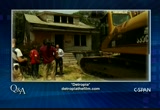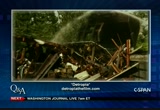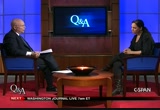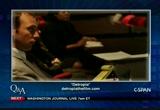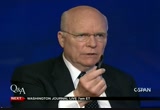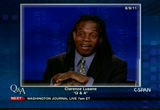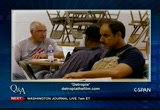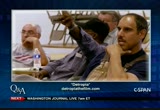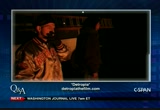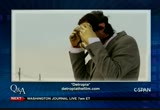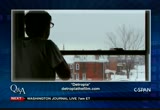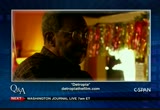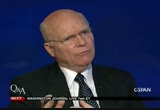tv Q A CSPAN October 29, 2012 6:00am-7:00am EDT
6:00 am
you watching him and his business over the years. >> that's right, my father is had a manufacturing company. he really like in the 1980s with the rise in japan had to innovate and come up with new ideas and making it difficult to create products. he started engineering complicated things that couldn't be replicated or stolen or easily made overseas. that's now his business arrived. i kind of had a front row seat to what it was like going you in the 1980s. how he survived was interesting it was all about being nimble and innovative. which i think detroit needs and the rest of the country pretty much needs right now. >> his business partners over the years, around detroit moved out of there to mexico or some other place other than the united states? >> my dad ran the business with his two bores.
6:01 am
-- brothers. they were adamant to keep their products made in the united states. however, i would say the vast majority, something like 60% of my father's went out of business. partly because of it was just cheaper to make things overseas. >> how many documentaries have you done before this one? >> a lot. i've been making films over ten years. this is our fifth documentary feature off of theaters. we made a lot of small and large television products for hbo. we make our living in the nonfiction world which is rare and lucky. >> are you based? >> new york city. >> which of those documentaries made it biggest? >> jesus camp. we made a film called "jesus camp." we lost to al gore convenient truth. we all knew we were going to lose.
6:02 am
it really sort of struck a nerve. it was really a look at the evangelical right through the eyes of children who are being home schooled and creationism, etcetera. it was at that time in 2007 a real window into this world. we impact judgment on the kids. sort of put a face on the nameless christian right. christian right responsible for electing george bush. for us, we went in and met these children and their families. we realized pretty quickly that these were the so-called foot soldiers for the right wing of the republican party. they also just believers and religious people and you know,
6:03 am
going to the beat of their own drum. really, it was eye opening for us. we really tried to just paint the picture of how things are with these communities without passing any judgment. >> i saw that documentary and he question as i was watching, why did this camp let you in? >> the families are proud how they raised their kids. becky fishers believes very strongly she's saving souls and she's bringing children to the lord. actually when we went to each family's home, long before the film premiered, we make it our business to go and show the final films the sum of our film. the first thing becky fisher, head of the camp said was, kind of watered it down. no one is going to watch this, it's so boring. i said becky, i come to you from
6:04 am
a secular planet. you have to listen to me. people are not going to just turn this off or not talk about it. this is considered -- i wasn't considered radical, this is considered hard core faith and belief. she was just like, all right, well, that's fine. all the parents and kids loved the film. they felt like it was an accurate representation of their lives. really, the strong reactions came from the outside of people. i thought that was very interesting. i became a much more tolerant person, much bigger protector of freedom of religion and speech after making that movie. i saw how some of the family and kids were ridiculed. thank god it wasn't today because it was really pre- twitter and all of that.
6:05 am
i was really alarmed by some reactions to be honest with you. we hadn't really expected that. >> what documentaries? what's the motivation? how much of it is a business versus you just like this medium? >> it's a terrible business to be in. if i was financially motivated, i would be doing something like reality television, god forbid. no one gets into documentary motivated by the business allure or the financial allure. although, we do make a fine living at it. but, really, it's rachael and my co-director and i, we share an incredible curiosity to learn and it's incredible gift that we're giving to be able to pick up the phone, knock on someone's door, go to someone's community and say hi.
6:06 am
please talk to me because i'm trying to tell this story. we ended up meeting people and experiencing things that most people never will. we never would. part of it's a little bit selfish because you're exposed to the world and especially our country because we focus mainly on domestic issues. almost exclusively. we do it because it becomes addictive. you know how that goes. you never run out of topics. i can't imagine that any scripted film people would say the kind of things they say in real life. in fact, with "detropia" with our new film, i get asked is anything is scripted in the film. the answer is of course, no way. some of the things that are said are so right on. it's like regular people, people just can't believe what they're hearing.
6:07 am
>> how did you get the money? >> for which one? "detropia" was easy to find strangely. we pitched the film, took about six month to raise the money. our two major partners were the ford foundation. not ford motor company, ford foundation in new york. obviously had ties to detroit and works in detroit and has initiatives in the city of detroit and also has a large film, called "just films." they were a major financier of the film. pbs was our second biggest funder. the private family foundation and finance documentary fund kicked in a little bit of money and impact partners which is an equity organization. the collection of us together, they financed the film.
6:08 am
no one had editorial control. that was one of the deal that's we had. we were able to raise the money without having to make promises to anybody which including pbs and including broadcaster. >> dave bling was mayor of detroit. -- dave bing is the mayor of detroit. what mayor is he? >> he's a clean mayor. he's an honest mayor. there's a history of corruption and all kinds of business with some of the city council and the mayors of detroit including kilpatrick who is now on trial. detroit is just come out of a feeling of sense of being empty handed and betrayed and tricked by their previous mayor. i think most detroiters will say kilpatrick tricked them.
6:09 am
dave being the right answer to kwame. dave bling has the most thankless job in america. the problem this man has been saddled with are almost insurmountable. the city declared bankruptcy in april and very narrowly averted it by going into a consent agreement with the state. republican governor schneider and mayor bling are co-managing the finances of detroit. it's a very slow recovery financially. there's still talk about a possible take over by the state. it will be the largest city ever taken over by the state. stock in california might be the largest of 300,000 people. mayor bling is an honest man. i don't know if he's a fantastic charismatic leader. you now, i think that detroiters like people are a little bit of swagger and attitude.
6:10 am
to be forthright as a mayor, he's been kept in closer to the vast than most detroiters are used to. >> let's look at a little bit of your film. obviously it's a commercial product and we will show bits and pieces. if people want to see this or they want to see jesus camp, how can they get them? "detropia" is playing in theaters across the country now. it in over 50 cities. people go to "detropia".com. it's in all secondary markets. d.c., new york, l.a., philadelphia, baltimore, etcetera. it's probably -- it's a varied experience. all of other films you can see on netflix or online. this film, "detropia" will be on dvd. >> run this opening and explain what's going on here. [video clip].
6:11 am
>> you're watching live one of 10,000 homes they are trying to get done in the next four years over the course of the four years of mayor bling term. these are houses that are never coming back. >> not right now, no. one family every 20 minutes is moves out. >> moving out of drought. these houses are disappearing from the landscape. >> 90,000 are ready to go. everyday nonstop. everyday. get them done, get another list. i know we got like 11 on this street. >> this is early in the
6:12 am
documentary, why? >> it's very early in the film. it's very important to set the stage to acclimate the audience. we chose a scene that is played out many times all day long all over the place in every season. we didn't start with something that was so provocative that we happen to capture it. this is something that we saw hundreds and hundreds of times happen. morelmost don't see it when you drive through detroit. these buildings really must come down because they're not being occupied and dangerous
6:13 am
structure. the city is doing what it must. it's still alarming at first to see so much going away. >> you point out detroit used to have close to 2 million people and now it's got 7er hundred thousand. what happened to the population? >> the population, well, you know, many people left. they didn't all leave the state. at least a million people moved to the suburbs of detroit, including my parents who were part of that so-called white flight out of detroit. but the truth is that there are riots in detroit in 1943. the population was never that comfortable with the arrival of so many african-americans in the south who came for the good jobs for the jobs when detroit became democracy and started becoming the center of world war ii.
6:14 am
even more people that already come, already started the great migration. more and more people came. the white population was never that comfortable with that. segregation is a very real part of the detroit pass. with the riots, it was really almost the final point. >> at 82% african-americans in detroit, it is the most african- american city in the united states? is it? >> i'm not quite sure. it's up there. i'm not sure if it's the number one. i'm not exactly sure. what's washington d.c.? >> it's down to close to 60 or 55%. >> i believe it's one of the top. >> you went about your task, partner white woman director, what was the reaction to you?
6:15 am
>> well, one of our photographers is african- american. race is always just under the surface. i just would sort of bring it up right away and explain quickly i was raised in farmington hill and my parents were detroiters. i just sort of addressed it right away. i know what you're thinking. a girl from the suburbs, i don't live here anymore, i went to mercy high school. let's get it out of the way. but i would spend my weekends in detroit and i know the city but i'm an outsider and a little bit of an insider. i would acknowledge it right away so we could talk about it. just pretending there's not some kind of racial divide or pretending we're exactly the same is fool hardty.
6:16 am
>> you took your cameras in to watch mayor bling and talk in the future. [video clip]. >> what we're seeing is that virtually the city illustrating some level of population decline over the last 50 years, we've lost about 50% of our population. if we were at about 1.86 million in 1955, we're arguably somewhere between 800,000 and 900,000 today within a city of the same size. the number of jobs is actually decreasing more. 50%re probably up into the real unemployment in the city. even though you may have some detroiters that get a job in detroit, once they get to a
6:17 am
certain level of income, they get the hell out of town too. that seems to be the direction a lot of folks take. but the reality of thinking that we're going to repopularize this area in significant numbers any time in the near term, i don't see that as not a reality. >> when do we think we'll be able to identify those neighborhoods that are stable where you really want to make investments? we have to start doing something. that's got to happen. otherwise, you're going -- we'll lose the people. >> part of what i noticed watching the documentary it's dark. you don't seem to use much artificial light and you certainly didn't in there i assume. >> we don't use lights at all. it all natural lights. that was a very dark space unfortunately.
6:18 am
we didn't do that on purpose. there was a quality to that scene that is hunkering down trying to solve the problem. leaning in, what are we going to do. this is what we're dealt with. in a way the look fit well with this particular scene. because the city is trying to figure out what to do and these problems are multifaceted. they are trying the best they can but there's only so much a administration can do in light of this kind of breath of problem. >> how do you pick the people? >> we met so many people. we could start by asking some reporters and some friends. we'd say if you were making a film in detroit, who were the ten people you absolutely would not miss. who are we going to miss that we shouldn't miss. we could get list of ten. in that meeting, many hundreds of people and eventually, we sorted out the chorus of people we thought could best tell the story and who we ended up filming are detroiters who middle class detroiters who
6:19 am
could leave but have chosen not to. the majority of our characters really could go. actually there was a poll taken today on the detroit news very startling poll. that people responded to and said 50% of detroiters if they could leave tomorrow, would leave. 40% say they intend to leave within the next five years. the accident has not stopped. there are newcomers but it has not bottomed out. it makes it even more significant the people we chose, for some reason, for one reason or the other feel that detroit needs them and they're going to stay. >> you mentioned this earlier, what impacted the riots of 1967 have on the city? >> i think the riots -- i think you don't want to overstate it. there have been riots in the past. it was pretty devastating.
6:20 am
partly it was never dealt with soon after. the next administration didn't deal with the racial divide. the city suburb divide was cemented and even from my aunts and uncle and the way they talk about detroit is sometimes it's not with derision and there's still anger there and that was their city. they feel in some way they had to leave. there's a lot of miscommunication and there's detroiters who stayed that would have left. there's still that very strong divide and i really haven't seen it anywhere else in the country. i say the impact was pretty heavy. >> statistics that i found, 43 killed, 400 injured and 7000 arrested in that. >> national guards had to come in and tanks in the street. >> i want to show you something. it popped up in the interview
6:21 am
some professor at a university. he was there. let's watch this. [video clip] >> it started on a saturday night. we had spent all day saturday in canada often people in detroit crossed the bridge and go fishing. when we got back, there was a full flown riot going on and it was a very hot evening. i was about 12 or so then. nobody was inside. at one point, my mother, my sister and i walked down couple blocks to this sort of main intersection where there was hundreds and hundreds of people. after being there for a while, a car drove up and two white men got out and fired at the corner. they lifted shotgun and fired. every one on the corner was hit. it was probably about 20 people. everybody was hit except for me.
6:22 am
my mother was shot, my sister was shot. some of the injuries were more serious than others. but everybody was -- people were bleeding and of course panic. >> the statistics, ten or 12 of the people killed were white and rest were black. how much federal money has been sent into detroit and state money trying to rebuild it and what impact does it have? >> there's a lot of efforts right now not just from the state and the federal government. but actually there's so many sort of n.g.o.s. every foundation you can think of was set up in detroit. every person you can think of around the world was like n.g.o. hot spot. everyone has their pet project and pet neighborhood and their
6:23 am
initiative, be it education and farming. everyone was dependent upon detroit. other people you know, feel that it's their responsibility, and foundation to assist the people and poverty. performing low school system. there's a high rate of illiteracy. there's something for every foundation in detroit. just recently, actually, you mentioned federal funding, 164 firefighters were laid off as part of this downsizing, as part of this effort for mayor bling to get the finances under control in the city. firefighters, which detroit needs because it's got sort of the highest case of arson in the country. these guys are laid off. about two weeks later, miraculously a hundred guys are
6:24 am
rehired. when you look to find out where the money came from, it's actually department of homeland security has the funds for things like that. i don't want to overstate, that's something you want to think about. the department of homeland security needed to step in to keep detroit as safe as it can be for the moment. we're talking about -- i wonder, we have seen the auto industry bailout, we've seen the bank bailout, are we head into an e.r.a. -- era of failed city. we talked about failed state. are we looking at a slew of bailouts that the federal government would have to step in for many municipalities on the brink. it's not just detroit. that's one of the messages of the film. when you got to tax base and you got a recession and housing bubble. at of our urban centers can't pay the bill and can't protect the people.
6:25 am
so detroit in so many ways is interesting to look at as a possibility for several other urban centers in this country. >> back to your "detropia." george mcgregor, how did you find him? >> i found him because of a tavern owner we were filming was hoping that the chevy bolt will help bring his business back. we went up to the plant and found out who was in charge. >> here he is. [video clip]. >> guys at $18.50 an hour, they will be going down to decrease in pay. they want to move them down to $14.50.
6:26 am
for factory support, which is the guys making $14.35, which they will lose $3.35 an hour on their wage. >> i ask him, how do i sit down with one of my members who is struggling to make $14.35 to sit at the table with their family and tell them that my union and i agreed to take a $3.35 pay cut. i asked her that. i said, i told you guys, negotiate any kind of agreement, it's going to be a liveable wage. what did she tell us about a liveable wage? >> i don't care about the guys having a liveable wage. >> point-blank. >> why? to beat us down. >> humiliate us. >> why? what good is that? they don't care.
6:27 am
that's the biggest problem. >> how much do they blame the north american free trade agreement for this? >> there's a lot of talk of nafta. >> lot of -- this plant they're talking about shuts down. >> basically the men are rehired in mexico. it already moved most of its operation. this is the last plant opened. when you look at what the employees are making, i believe it's $3.52 an hour all end. there was no way to these guys could have actually accepted, i believe, that would have convinced or persuaded this company to stay. there in lies the real conversation. we need to bring corporate
6:28 am
america to the table in some kind of way because it's just going -- to be on price, everyone will be laid off. this just articulates what that looks like. you hear about both candidates now, the shrinking for the middle class. the middle class is going away. what does that actually mean? what does that look like. in detroit, making this film "detropia," we sort of experience what that looks and feels like from people who are experiencing it. that's what you see. >> both democrats and republicans passed nafta. both liberals and conservatives supported nafta. what's the solution? is there enough money in the federal till to bail out detroit? >> i don't think there is enough. there might be enough money in the federal till to bailout detroit. i don't know if there's enough money for other cities lining up behind detroit.
6:29 am
the one party i could not get to speak to me at all was any representative from any corporation. which is sad, that's sort of the missing element. we need to figure out -- you want to persuade some of these corporations that, you know, you want to get them incentives to stay. in detroit, i think should really be seducing businesses to come. there's a lot of land, lot of people out of work. tax incentives will come, that will be wonderful. you also need some sort of assurance that these companies are basically decimating the people that would eventually buy their products. i feel like conversation happening. how do we keep the corporations here. how do we make that happen. i would like to hear that. they continue it leave this droves. >> if you watch the full documentary.
6:30 am
there's a lot of music. not a narrator. we're not giving people the feeling of a documentary. let me run a little bit george mcgregor from your documentary. [video clip]. >> we became a american made washing machine or the iron. where did all of your manufacturing base go? we built everything. everything, america did. we have a standard living in america that the working guy provided, a standard of living, which is eroding now but it a standard of living that the working guy. it started right here in detroit. right here in detroit, a middle class started right here. everybody know it. we just got to face up to it --
6:31 am
to send our kid to school. middle class. got a boat. -- got to vote. you understand what i'm saying? middle class. >> is there anything that people like george mcgregor or uaw in general did wrong. >> absolutely. there's a lot of blame to go around. the unions are not blameless in this. there was definitely a time they had a lot of extras going on. i mean, george described, we weren't able to use it in the film, he described a program called the homework hotline so that employee's child at general motors could call 24 hour hotline and get help with their homework and there was someone there to help them with it. that's really nice but that cost money. the vacation days, the sick leaves, there were people in the past that fall down on the job.
6:32 am
it was too hard to fire people. there was a time for sure where it was too bloated and so was management taking sort of producing subpower car and paying themselves too much. overall, the industry behaved as a cartel at time. refusing to make small cars. meanwhile honda and toyota proved them wrong and we lost some market share. so many mistakes were made. i have to say, we did learn making this film, of course, the basics such as that, after the bailout,u.a.w. did agree to take a 50% wage cut for all the new hires. the incoming wage went from $28 to $14. at this point, i think it gotten leaner. i don't know if that will be enough. they say the industry is roaring back but we'll never regain the market share that we lost. i don't believe.
6:33 am
it's funny because people say, well, they say that the auto industry posting huge profits. that doesn't translate into a mass amount of jobs anymore. in terms of employment, they will not be able to employed anymore. >> where did you get your training for this? >> making documentaries? >> yes. >> just doing it. i went to georgetown school of foreign service. i got the film -- i joined film society and we started making movies. i changed my mind -- instead of trying to join the state department, i moved to los angeles and work apprentice for years. documentary filmmakers, always non-fiction. people make documentaries, usually come at it with a variety of backgrounds. very few of us took the film route. you need investigative sense and patience and you need to be a good listener, persuasive and have an ear for material.
6:34 am
>> how many hours did you shoot? >> too many, five hundred hours on this one. rachael and i met in new york. we were working for another producer. we were asked to produce a two hour tv special on the church of scientology. nobody wanted to make the film because i think people were afraid of the church of scientology. we did it and it was a fascinating experience. we met on that film and in 2001 we started films in new york city our own production company. >> more from "detropia." who named it? >> i did. >> when did you get that? >> couple weeks before sunday. we didn't have a title. we opened up film up sunday in january. it needed a title.
6:35 am
we couldn't figure out what to call it. there was a shot in the film where an auto part store has been converted by an artist to read instead of auto parts, it reads "detropia." we started playing with the concept. >> this next one is about scrap metal. where did you run into that? >> that was lucky for us in the sense that these guys are doing something illegal and they don't come up and tell you i want to be filmed. we were driving one wintery night and i saw a spark in this field. very strong orange flame and we stopped the car and i said, i think these guys are taking down this building. we approached and somehow we were able to film the scene. >> okay, we'll watch it. [video clip].
6:36 am
>> just make sure we weren't stealing nothing and we're just careful. if they had any complaintings they would have to run us off. >> can't get a job. we're still getting 11-cents a pound. if we take copper, you get $2.50 a pound. >> it goes somewhere and gets melted. >> goes everywhere. china. >> why it goes to china? >> so they can make stuff and sell it back for more. >> how does that work? how do they make money?
6:37 am
>> these guys know more about the price of metal on the international market than most people. they keep track of what the price of copper, steel, aluminum and all the metals every single day. it goes up and down. if the price is good enough, they get up and they go and try to find those metals from abandoned factories and homes and things like that. they take it to scrap yard, which closes at 10:00 p.m. and they weigh it, they get their money and they're right. especially copper. it crucial and it's expensive. basically these guys are the clean-up crew.
6:38 am
>> do you have idea how much they make? >> apparently they each made 200 bucks. >> they take the metal out of buildings? >> actually they adjust taking down -- what we found out later was a cadillac repair shop which was too devastating to put in the film. i couldn't put that information in there. yes, they go into homes. most of these guys go into abandoned buildings. you go into most of the structures in detroit, the structure is there. >> who are the coys? >> the coys are newcomers. he met in hawaii. they heard of detroit and they heard it was urban and exciting. detroit is becoming an attractive place for people like them.
6:39 am
>> we see them in a building. how did you find them? >> i found them, i forget how i found them. they do graffiti art, installation and they sort of take the structure of detroit like many artists and making them into their own personalized project. [video clip]. >> we have a project we want to do. we started evaluating. we looked at baltimore and looking into new york city and detroit came up. i knew that's one thing detroit had abundance, old warehouses.
6:40 am
about a couple weeks ago, we were able to keep our studio because everything is so affordable. >> detroit is constantly amazing me. feel like this is redefining what the value of things are, $25,000 for an amazing loft. i don't know, that makes it accessible for people like me. i would never be able to afford a home as an artist. here i am with a studio and apartment. in a major city functioning for like $700 or less a month. >> we can experiment here because if we fail, we haven't really fallen anywhere.
6:41 am
>> what's your sense of how many people will do what they're doing? >> i think it's been about 50,000 people come in the last five years. i believe. i hope i didn't get that number wrong. i have to double check it. it's hard to tell how many have come over the last five years, i think. i know there's been a 59% increase a young population coming in the last five years to detroit. will they stay? i don't know. a lot of them work in restaurants, coffee shop or don't have to work because the rent is so cheap. when they have children, will they send their children to public schools. it's very unknown thing but it's very interesting trend because i think that what we're seeing is young college educated, mostly caucasian kids who would have moved to chicago or new york or philadelphia or los angeles, can't afford it because they're not finding employment.
6:42 am
a place like detroit, it's a place that needs them. they can sort of make a mark. they can live for super cheap. they can have a loft. they can mingle with other people. there is a community growing. very specific neighborhoods and midtown detroit. it's become a trendy thing. i don't know if it's a trend that will be long term. >> you said you grew up in farmington hills. what's that like and how far is it from downtown detroit? >> 25 or 30 minute drive. i grew up 5 miles from the city limit of detroit. i group. on 12-mile. it's a world away. it's got suburban, lofts and box tours and coffee shops. it's decent public schools.
6:43 am
interesting when i grow up mostly caucasian people there, all the caucasian people there are mixed now. which is a good thing. partly because the black middle class made an exit out of detroit and made it into the suburbs. most people that could leave have left. >> why should detroit be saved? why there should be a lot of money pumped in there? >> i don't think this country is willing to let detroit go. it might be for reasons of nostalgia. it is detroit. it holds a special place. it's just -- this country will not allow detroit to become completely abandoned and to fail.
6:44 am
i don't think it's going to happen. i think it's a point of personal pride. it the same reason that we have an american auto industry that no one wanted to allow to go bankrupt. >> you lived there what year? >> this film was made 2010. >> both of you lived there? >> we took turns. we got apartments in downtown detroit. >> were they cheap? >> yes. >> how do you and rachael divide your responsibility? >> it depends. we cast the films together. we chose most of the subjects together. we come up with the look and
6:45 am
feel and the tone of the film together and then we go on locations separately. we don't go there together. it's better to have one person in the field and other have objective view of the material. she watch the material that filmed and we'll show pieces on the editor. majorighs in and she's a collaborator of ours. >> do you both have families? >> rachael had a baby in the first week of production begin. she was on location a little bit less because of that. i don't have children. i have a husband and she has a child. >> character named tommy stevens. who is he? >> mr. tommy stevens is the heart and soul of "detropia." he's a retired school teacher. he is a black middle class man who could leave detroit but doesn't.
6:46 am
he owns the last black-owned blues bar in detroit. on the east side of detroit it's called the raven lounge. he opens every friday and saturday nights. some people come and sometimes they don't. it was a really busy business. he's watched as industry has failed. he watched his customers go away. he's an interesting guy to look at because the proximity of the plant. just because he's an amazing street philosopher. [video clip]. >> capitalism is a great system. i love it. but, it exploits the weak. always does. unfortunately. you know, one of the sociologist i used to read back in the 1960s, said that the upper class needed the middle
6:47 am
class to buckle the poor. that if you take the middle class away, the upper class will have problems from your lower class. you got to think about it now. only 2% of americans exceed $300,000 a year. if you wipe out the middle class there, are you going to have 98% of poor folks in this country? >> what do you think of his philosophy there? >> well, he ends up saying that if there's no buffer between rich and poor, the only thing left is revolution. he's not calling for revolution or riots. the man is observing that at some point, this is going to break.
6:48 am
at some point when you've got the amount of jobless people and it goes on the rise and people would have lost their dignity and ability to provide, you know, economic revolution is a possibility. he said this a year before the occupy wall street. it was interesting. of course occupy wall street didn't go anywhere. the idea that there would be this conversation happening and royaling in this country, he observes that. i think he is somebody who articulate what is a lot of people feeling which is that somehow, working hard and doing the right thing, keeping your head down and putting in the hours, that used to translate into at least a desent lifestyle. that was some sort of guarantee. we imagined it would be a guarantee. he's deserving what a lot of people now which is anxiety and panic that they won't reap the benefits of capitalism.
6:49 am
>> what do you think? you group up with a father who is an entrepreneur who is a capitalist. >> that's right and he's a republican. >> this man had a business. >> he's a great businessman. he buys houses in detroit and renovates and them and rent them to people. he believes the free market and he loves capitalism and he believes in the free market and identifies that something is broken. we need to find a way out of this. i'm not an economist, i'm a filmmaker, the idea that, i think that we believe we didn't
6:50 am
need those jobs anymore. we didn't need those dirty jobs. we could do better. something better was on the way. why not let those jobs go. i think it was shortsighted because we didn't realize we haven't replaced it. we've been swirling around trying to figure out what it is. so many millions of low skilled people were able to have a decent lifestyle an education, you have a job. mr. stevens and his own matter of fact way seems to be making those observations. >> is crystal starr her real name? >> yes. ae's a star and she's detroiter and born and raised. she's a poet, she's a writer, she's a blogger. who's trying to stay in detroit
6:51 am
because she loves it. trying to make ends meet and trying to figure out what's there for her as a young curious and intelligent person. >> when you were following her around, how was it set up and why where she was in the old mansion and the theaters? >> she said you suburban kids had tree houses. we had abandoned buildings and that's where we have our fun. she goes in the buildings all the time, she was doing it already. that's one of the reasons we capture her. that's what she do in your free time go to the old hotel and apartments. she would get her book and figure out what used to be there, what was detroit she didn't experience. that hay day and that important big grant city. she never experienced. her parents barely experienced it.
6:52 am
but yet people talk about it all the time. she represents that holding on to an era and not experiencing it. >> how much education does she have? college got some experience. >> she's a blogger? >> yes. she's a video blogger. she has cultural salons on the weekend. >> let's watch crystal starr. [video clip]. >> history is one of my things even since grade school. that's a passion. what was there, who was there. wow, it's amazing where you see they ripped out the walls. there's copper pipe right there.
6:53 am
can you imagine like having breakfast right here. look at your view. look at your view in the morning. yes, i'm going to go out and conquer the world. i can see it from right here. motown right up the street. i feel like i was may be here a little while back or i'm older than i really am but i have like this young body and spirit and mind but i have the memory of this place when it was banging. that's how i feel. >> lot of people feel that way. lot of detroiters feel that way. some people have a memory of the
6:54 am
place when it was banging because they were there. people like crystal have a memory of the place she heard about it, read about it, dreamed about it and she was told about it. there was that hope that it could somehow come back, return to greatness, i think it won't. i think it should come something different. transform itself smaller and functional. but returning to that era, no city can do that. >> i'm going tend it not some of your video but before i do that, i want to ask you about it. because within the last couple years, "60 minutes" did a big feature on rodriguez. rodriguez lived in places like you're seeing here. no one knew about him and he had been a singer . what do you think the rest of the world saying about your "detropia"? your documentary. also seeing rodriguez and other
6:55 am
looking for sugarman. what's the image portraying to the rest of the world? what's the message? >> i think the message in that film is a totally different animal. i actually ran into rodriguez while filming "detropia." he was an amazing talent that was lost to the world forever, working in detroit in construction. then he was plucked out and he was found that filmmaker and return to greatness, celebrity. rodriguez has experienced the harsh realities a lot of detroiters have. this is a country in transition and in a bit of identity crisis. we trying to figure out what the next 50 years will look like. other countries have been through it. this country is final talking about those realityings for maybe the first time i think we're projecting to the world an honest reassessment where we come from.
6:56 am
>> "detropia" can be found in movie theaters. itunes and dvd in january. >> i get to sleep for a year. we just finished a film it looks at islam phobia. >> when is that going to run? >> not sure yet. >> this is a little bit inner city blues. not connected with your film. but it captures another personality from that state. thank you heidi ewing for joining us. >> thank you for having me. [video clip].
6:57 am
6:58 am
who >> if you consider, and while ago, no one would ever agree to carry around a tracking advice. but now we all carry around phones which you can inherently track. nobody would let anyone read their e-mail, but a lot of us use gmail, and it is all stored on a server at google. we, as a society, have given our information out. >> will looking at a cyber, and
6:59 am
cybersecurity. the pentagon declared cyberspace as a newcomen of war. we realized that maybe one of 1000 people understood what cyberspace was. what we are trying to do is to take pieces of it can't explain the fundamentals. the idea is that everybody from my parents, to congress, and people around the country can understand and maybe start a process of coming up with ways to defend it cyberspace better. eastern. t at 8:00 christi eastern. t at 8:00 christi >> this morning, bob biersack
197 Views
IN COLLECTIONS
CSPAN Television Archive
Television Archive  Television Archive News Search Service
Television Archive News Search Service 
Uploaded by TV Archive on

 Live Music Archive
Live Music Archive Librivox Free Audio
Librivox Free Audio Metropolitan Museum
Metropolitan Museum Cleveland Museum of Art
Cleveland Museum of Art Internet Arcade
Internet Arcade Console Living Room
Console Living Room Books to Borrow
Books to Borrow Open Library
Open Library TV News
TV News Understanding 9/11
Understanding 9/11










